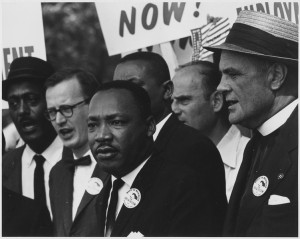Why Privacy is Important
The letter, claiming to be from a disappointed admirer and riddled with affected misspellings and errors, laid out a number of details of King’s infidelities, and ended with the following threat:
The American public […] will know you for what you are – an evil, abnormal beast. […] You are done. King, there is only one thing left for you to do. You know what it is. You have just 34 days in which to do […] There is but one way out for you. You better take it before your filthy, abnormal, fraudulent self is bared to the nation.
King received the letter just days after he became the youngest person ever to receive the Nobel peace prize.
Fortunately, King did not kill himself – and, when the FBI tried to make good on its threat to leak surveillance material showing his infidelity, the conservative press of the time largely ignored it. And that was the unceremonious end of the FBI’s campaign to murder Martin Luther King Jr. For a long time, the full extent of the letter was not known – the full, uncensored version did not become available until November of this year. The reporting on it has been pretty quiet – it’s old news, so they say. Certainly nothing that could be relevant to modern politics.
 In the decades since this whole nasty affair, we’ve been told over and over again that privacy is unimportant. If we’ve got nothing to hide, why should we be afraid of government agencies rooting through every detail of our private lives? Just recently, the FBI attempted to pressure Apple into abandoning its efforts to encrypt its smartphone data to make it harder for thieves and intelligence agencies to extract data from the devices.
In the decades since this whole nasty affair, we’ve been told over and over again that privacy is unimportant. If we’ve got nothing to hide, why should we be afraid of government agencies rooting through every detail of our private lives? Just recently, the FBI attempted to pressure Apple into abandoning its efforts to encrypt its smartphone data to make it harder for thieves and intelligence agencies to extract data from the devices.
The same anti-privacy, anti-cryptography narrative has often been applied to Bitcoin, as well as more mature cryptographic technologies like asymmetric encryption and traffic anonymizers like Tor. The privacy guarantees of Bitcoin, with its publically-readable transaction log, are relatively anemic compared to (for example) cash or more exotic schemes like Zerocash. We are, however, told that that privacy is unacceptable. After all, we might be sending money anywhere, to anyone! How will the government tax, or judge the validity of our purchases? We could be spending our money on anything!
The King affair, I think, stands as a stark reminder for why this sort of thing is a load of hooey. When a bad administration (the Hoover presidency) wanted to use illicit surveillance to eliminate a political rival, nothing within the government stopped it. The FBI quietly and effectively did their jobs and proceeded to create and execute a plan to murder a civil rights leader. That was a (relatively) transparent organization, the FBI. Organizations like the NSA and CIA operate in near-total secrecy and have repeatedly demonstrated a grotesque disrespect for the rule of law, and it’s an open secret that the CIA semi-routinely engages in covert murder. It seems unlikely that either would draw a moral line at blackmail.
Imagine that the next president (imagine them to be a member of whichever political party you most dislike) decides to eliminate a political rival (a leading member of whichever political party you most favor) by using one of the government’s enormously sophisticated intelligence-gathering programs for blackmail. Do you think they’d have much difficulty? Do you think we’d find out? Under the most whistleblower-hostile administration in American history? The Lois Lerner affair has already taught us that even in the case of flagrant, obvious violations of the law, the odds of the government prosecuting itself are minimal.
Personally, I think that the NSA would do its job, quietly, efficiently, professionally, and at enormous cost to the ideals of American democracy – just as the FBI did in 1964. Not every politician has secrets that could ban them from public life… but most of them do, and selectively destroying their reputations would be an extremely powerful tool for those in power.
The truth is, we need cryptography, and we need Bitcoin. Frankly, we need everything we can get, to shield our private lives from prying eyes. The government’s system of checks and balances intended to protect us from abuse have been dysfunctional since at least the 60’s, and are likely in even worse disrepair today. Bitcoin’s anonymity isn’t dangerous, it’s absolutely necessary.
Image credits:
Martin Luther King Jr. – Public domain image
Privacy image – EFF (The Electronic Frontier Foundation)


![[Guest Post] The True Use Cases for Bitcoin and Its Role in Banking the Unbanked](https://coinreport.net/wp-content/uploads/2019/04/Ray-Youssef-Paxful-CEO-400x230.jpg)











We are not familiar with the FBI’s claims that MLK was indeed, a member of Communist Party, other than MLK did have communist affiliations and communist comrades within his org.
Martin Luther King (MLK)…and His Communist Affiliations:
http://chasvoice.blogspot.com/2011/10/martin-luther-kingking-of-america.html